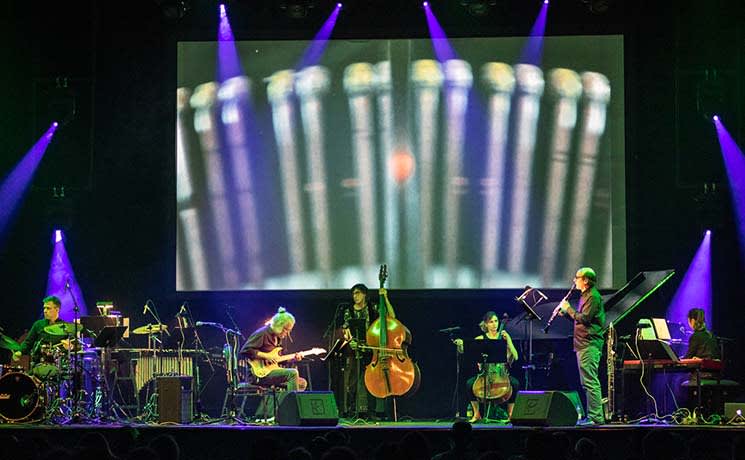Bang on a Can, from NYC, have been around in some form or other for almost as long as the 35 years of the Festival International de Musique Actuelle de Victoriaville itself, yet this was the first time they've performed at the festival, and they proved worth the wait.
The six-piece, plus live audio and film support, performed selections from their current ongoing series, Field Recordings. Solicited from an array of artists and composers, each piece is built upon gathered and/or assembled artefacts that proved to be as eclectic as their originators.
The first piece, appropriately for the festival, was a composition called Reeling, from American composer Julia Wolfe, who took as a source a traditional vocal reel from French Canadian singer Benoit Benoit. His folkloric rhythms were gently edited into gradually more complex loops that the musicians accompanied deftly.
Other highlights were Fade to Slide, by Christian Marclay, featuring a short film in the style of his noted art piece The Clock. Here, a succession of quickly edited images of liquid, breaking glass, vintage turntables, accordions and other elements featured sound that in effect acted as a seventh musician onstage.
Local legend Réné Lussier contributed Nocturne, a recording of his partner´s nighttime breathing and buzzsaw snoring, which was playfully scored by the ensemble, notably accompanied by cellist Mariel Roberts' precise tonal mimicry. The best moment was Canadian composer Nicole Lizée´s Dancist, featuring a whimsical and surrealist short documentary about a man seeking to understand dance music. Much hand clapping, ripping newspapers and vibraphonic polyrhythms ensued.
In opening up the sometimes stodgy and overly intellectual world of contemporary composition to such playful elements, Bang on a Can proved you can be a heavy hitter musically, but still employ a light touch.
The six-piece, plus live audio and film support, performed selections from their current ongoing series, Field Recordings. Solicited from an array of artists and composers, each piece is built upon gathered and/or assembled artefacts that proved to be as eclectic as their originators.
The first piece, appropriately for the festival, was a composition called Reeling, from American composer Julia Wolfe, who took as a source a traditional vocal reel from French Canadian singer Benoit Benoit. His folkloric rhythms were gently edited into gradually more complex loops that the musicians accompanied deftly.
Other highlights were Fade to Slide, by Christian Marclay, featuring a short film in the style of his noted art piece The Clock. Here, a succession of quickly edited images of liquid, breaking glass, vintage turntables, accordions and other elements featured sound that in effect acted as a seventh musician onstage.
Local legend Réné Lussier contributed Nocturne, a recording of his partner´s nighttime breathing and buzzsaw snoring, which was playfully scored by the ensemble, notably accompanied by cellist Mariel Roberts' precise tonal mimicry. The best moment was Canadian composer Nicole Lizée´s Dancist, featuring a whimsical and surrealist short documentary about a man seeking to understand dance music. Much hand clapping, ripping newspapers and vibraphonic polyrhythms ensued.
In opening up the sometimes stodgy and overly intellectual world of contemporary composition to such playful elements, Bang on a Can proved you can be a heavy hitter musically, but still employ a light touch.
